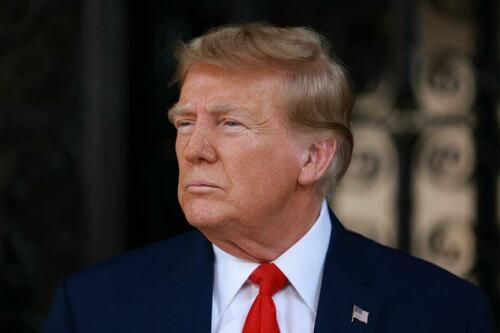
Authored by Caden Pearson via The Epoch Times (emphasis ours),
Former President Donald Trump filed several motions to dismiss a classified documents case being pursued against him in Florida on Thursday, arguing that, amongst other things, special counsel Jack Smith “lacks the authority” to prosecute the case.

In one of four motions, attorneys for the former president contend that neither the U.S. Constitution nor Congress had officially established the special counsel’s office, rendering Mr. Smith’s appointment invalid.
Furthermore, they argue that the special counsel’s office is being funded “off the books” by the Biden administration.
The motion, which cites the Appointments Clause, argues that Attorney General Merrick Garland did not have the authority to appoint a “like-minded political ally” as special counsel “without Senate confirmation.”
“As such, Jack Smith lacks the authority to prosecute this action,” the motion reads.
President Trump’s lawyers argue that the only remedy is to dismiss the superseding indictment.
The Appointments Clause stipulates that all federal offices, except for the president’s, must be established by Congress and appointed with the advice and consent of the Senate. This is with the exception of federal offices created through the Necessary and Proper Clause, which empowers Congress to make laws necessary and proper for carrying into execution the powers vested in the government.
“There is, however, no statute establishing the Office of Special Counsel,” the motion reads.
“As a result, because neither the Constitution nor Congress have created the office of the ‘Special Counsel,’ Smith’s appointment is invalid and any prosecutorial power he seeks to wield is ultra vires,” meaning beyond his authority.
Funding of Smith’s Office Challenged
In addition to arguing that Mr. Smith’s appointment was unlawful, the four motions argued that the case should be dismissed on the basis of presidential immunity, the Presidential Records Act, and unconstitutional vagueness.
Mr. Garland appointed Mr. Smith as special counsel on Nov. 18, 2022, to “prosecute federal crimes arising from the investigation” into President Trump’s handling of classified documents seized from his Mar-a-Lago estate in Palm Beach.
President Trump’s attorneys argue in their Thursday filing that Mr. Smith, at best, is classified as an employee rather than an “officer” under the statutes cited by Mr. Garland in making his appointment, which they say lacks the legal foundation required by the Appointments Clause.
Attorneys for the former president argue that Mr. Smith’s office is drawing from an endless “off the books” pot of money from the Department of Justice (DOJ) instead of the ordinary budget process, in violation of the Appropriations Clause of the Constitution.
“President Biden’s DOJ is paying for this politically-motivated prosecution of Biden’s chief political rival ‘off the books,’ without accountability or authorization,” the motion reads.
President Trump’s attorneys, Christopher Kise and Todd Blanche, note in their motion that Mr. Smith’s office spent nearly $13 million in Fiscal Year 2023.
According to the filing, this money did not come from the DOJ’s budget but from the “permanent indefinite appropriation” only available to independent counsels appointed under the Independent Counsel Act or other law—and not to special counsels.
“Smith is not an independent counsel, but the nearly $13 million that Smith spent in Fiscal Year 2023—with no accountability—is more than 10% of the annual budgets of DOJ’s Tax and Environment and Natural Resources Divisions,” the motion reads.
A spokesman from Mr. Smith’s office declined to the comment when contacted by The Epoch Times.
Presidential Records Act, Vague Law, Immunity
In three other motions filed on Thursday, attorneys argue that President Trump is immune from prosecution, had the authority to designate the records as personal while in office, and that Section 793(e) is vague and doesn’t apply to the president.
The former president’s attorneys argue in a motion that he exercised his Article II executive authority to designate the records as personal while still in office and that the Presidential Records Act (PRA) granted President Trump “unreviewable discretion” to do so.
Emphasizing the president’s role as the “constitutional superior of the archivist,” the attorneys assert that President Trump possessed the authority to determine the classification of records during his tenure.
The motion maintains that the National Archives and Records Administration (NARA) holds no sway over personal records.
Furthermore, the attorneys assert that the sole recourse available to NARA is through civil enforcement mechanisms, not criminal investigations. They contend that this wipes out the basis for the 32 counts against President Trump outlined in the superseding indictment.
“Accordingly, pursuant to the PRA, the Superseding Indictment must be dismissed,” the motion reads.
President Trump’s attorneys, in a separate motion, asked the court to dismiss counts one through 32, citing the “void-for-vagueness doctrine.” They argue that the law is unclear and, therefore, unconstitutional when applied to President Trump.
They further argue that President Trump is “immune from prosecution” one counts one through 32 because those charges are based on his “alleged decision to designate records as personal” and to “cause the records to be moved from the White House to Mar-a-Lago.”
“As alleged in the Superseding Indictment, President Trump made this decision while he was still in office. The alleged decision was an official act, and as such is subject to presidential immunity,” the motion reads.
This report was updated with a statement from Mr. Smith’s office.
Authored by Caden Pearson via The Epoch Times (emphasis ours),
Former President Donald Trump filed several motions to dismiss a classified documents case being pursued against him in Florida on Thursday, arguing that, amongst other things, special counsel Jack Smith “lacks the authority” to prosecute the case.

In one of four motions, attorneys for the former president contend that neither the U.S. Constitution nor Congress had officially established the special counsel’s office, rendering Mr. Smith’s appointment invalid.
Furthermore, they argue that the special counsel’s office is being funded “off the books” by the Biden administration.
The motion, which cites the Appointments Clause, argues that Attorney General Merrick Garland did not have the authority to appoint a “like-minded political ally” as special counsel “without Senate confirmation.”
“As such, Jack Smith lacks the authority to prosecute this action,” the motion reads.
President Trump’s lawyers argue that the only remedy is to dismiss the superseding indictment.
The Appointments Clause stipulates that all federal offices, except for the president’s, must be established by Congress and appointed with the advice and consent of the Senate. This is with the exception of federal offices created through the Necessary and Proper Clause, which empowers Congress to make laws necessary and proper for carrying into execution the powers vested in the government.
“There is, however, no statute establishing the Office of Special Counsel,” the motion reads.
“As a result, because neither the Constitution nor Congress have created the office of the ‘Special Counsel,’ Smith’s appointment is invalid and any prosecutorial power he seeks to wield is ultra vires,” meaning beyond his authority.
Funding of Smith’s Office Challenged
In addition to arguing that Mr. Smith’s appointment was unlawful, the four motions argued that the case should be dismissed on the basis of presidential immunity, the Presidential Records Act, and unconstitutional vagueness.
Mr. Garland appointed Mr. Smith as special counsel on Nov. 18, 2022, to “prosecute federal crimes arising from the investigation” into President Trump’s handling of classified documents seized from his Mar-a-Lago estate in Palm Beach.
President Trump’s attorneys argue in their Thursday filing that Mr. Smith, at best, is classified as an employee rather than an “officer” under the statutes cited by Mr. Garland in making his appointment, which they say lacks the legal foundation required by the Appointments Clause.
Attorneys for the former president argue that Mr. Smith’s office is drawing from an endless “off the books” pot of money from the Department of Justice (DOJ) instead of the ordinary budget process, in violation of the Appropriations Clause of the Constitution.
“President Biden’s DOJ is paying for this politically-motivated prosecution of Biden’s chief political rival ‘off the books,’ without accountability or authorization,” the motion reads.
President Trump’s attorneys, Christopher Kise and Todd Blanche, note in their motion that Mr. Smith’s office spent nearly $13 million in Fiscal Year 2023.
According to the filing, this money did not come from the DOJ’s budget but from the “permanent indefinite appropriation” only available to independent counsels appointed under the Independent Counsel Act or other law—and not to special counsels.
“Smith is not an independent counsel, but the nearly $13 million that Smith spent in Fiscal Year 2023—with no accountability—is more than 10% of the annual budgets of DOJ’s Tax and Environment and Natural Resources Divisions,” the motion reads.
A spokesman from Mr. Smith’s office declined to the comment when contacted by The Epoch Times.
Presidential Records Act, Vague Law, Immunity
In three other motions filed on Thursday, attorneys argue that President Trump is immune from prosecution, had the authority to designate the records as personal while in office, and that Section 793(e) is vague and doesn’t apply to the president.
The former president’s attorneys argue in a motion that he exercised his Article II executive authority to designate the records as personal while still in office and that the Presidential Records Act (PRA) granted President Trump “unreviewable discretion” to do so.
Emphasizing the president’s role as the “constitutional superior of the archivist,” the attorneys assert that President Trump possessed the authority to determine the classification of records during his tenure.
The motion maintains that the National Archives and Records Administration (NARA) holds no sway over personal records.
Furthermore, the attorneys assert that the sole recourse available to NARA is through civil enforcement mechanisms, not criminal investigations. They contend that this wipes out the basis for the 32 counts against President Trump outlined in the superseding indictment.
“Accordingly, pursuant to the PRA, the Superseding Indictment must be dismissed,” the motion reads.
President Trump’s attorneys, in a separate motion, asked the court to dismiss counts one through 32, citing the “void-for-vagueness doctrine.” They argue that the law is unclear and, therefore, unconstitutional when applied to President Trump.
They further argue that President Trump is “immune from prosecution” one counts one through 32 because those charges are based on his “alleged decision to designate records as personal” and to “cause the records to be moved from the White House to Mar-a-Lago.”
“As alleged in the Superseding Indictment, President Trump made this decision while he was still in office. The alleged decision was an official act, and as such is subject to presidential immunity,” the motion reads.
This report was updated with a statement from Mr. Smith’s office.
Loading…







